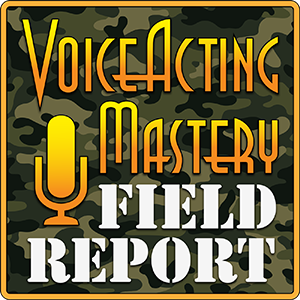VAM 117 | Interview with America Young, Part 1
Welcome to episode 117 of the Voice Acting Mastery podcast with yours truly, Crispin Freeman!
As always, you can listen to the podcast using the player above, or download the mp3 using the link at the bottom of this blog post. The podcast is also available via the iTunes Store online. Just follow this link to view the podcast in iTunes:
http://www.voiceactingmastery.com/podcast
Welcome to the first part of my interview with a woman who seems to have so many different abilities that it’s difficult to know quite how to categorize her! America Young has worked as a voice actress, an on-camera actress, a commercial actress and a stunt performer in addition to directing and producing her own films! She’s been working in the entertainment industry in one form or another since she was 6 years old! Her breadth of experience is truly astounding and I could spend multiple episodes just talking about the various projects she’s worked on. However, for the purposes of this podcast, I decided to focus on America’s voice acting resume and how she was able to translate her theatrical and stunt experience into becoming a motion capture actress.
One of the most interesting developments in the entertainment industry in the past decade or so has been the incorporation of motion capture performances into films and video games. Motion Capture, also called Performance Capture, is a means of recording an actor’s performance not on film, but digitally inside the virtual 3D space of a computer. This allows animators to then manipulate that performance and use it to bring characters to life in films and video games.
Motion Capture is utilized extensively in the video game industry to help animate characters for gameplay. It’s also used to create in-game cinematics. More and more actors are being asked not only to voice a character in a video game, but to supply a physical performance for that character as well. Since this is such a new and developing niche, I felt it was important to share with my audience what it takes to work in the world of Motion Capture.
While there are certain techniques specific to motion capture that you definitely must master in order to be successful, motion capture is still acting; it requires the same solid acting skills that any performance medium does. Therefore, in the first part of this interview, America and I discuss her background as a performer. We cover what inspired her to pursue acting, what challenges she faced early in her career, and how she was able to break into the industry. Following America’s journey towards becoming a professional actress in film and voice over is very enlightening. It will help you understand the foundational skills you as a voice actor need to develop in order to be an effective Motion Capture performer. That way you can be prepared when the opportunity arrises!
Download Voice Acting Mastery Episode #117 Here (MP3)
VAMFR 012 | Interview with Tony Oliver, Part 1

VAMFR 012 | Interview with Tony Oliver, Part 1
Welcome to episode 12 of the Voice Acting Mastery: Field Report podcast!
In this episode our correspondent, Tom Bauer is honored to interview one of his personal voice over mentors: Tony Oliver.
Tony’s résumé runs the gamut in the entertainment and voice over industry. He is probably most famous for his voice acting work as Rick Hunter in the ever-popular anime series Robotech. He’s also played the voice of the mischevious Lupin in the Lupin the Third anime TV series. Tony worked for many years as a writer and producer on the famous Mighty Morphin’ Power Rangers television series for Saban Entertainment. If that wasn’t enough, Tony is also a talented director and teacher, directing such popular anime titles as Gurren Lagann and Hunter X Hunter.
Tom first met Tony when he took one of his voice acting classes in November of 2012. Soon after, Tom had the good fortune of getting to know Tony as a director when they worked together on the anime series, Magi: The Kingdom of Magic, where Tom was cast as Nero and Ren Hakuyu.
In this first episode, Tom focuses on Tony’s early career. Tony explains how he got his start as a voice actor and how his breadth of experiences and the challenges he faced led him to where he is today as a voice over director. He also stresses the importance of continually training yourself as an actor so that you’re prepared for anything when it comes time to perform. But Tom is happy to let Tony tell you more about that!
The VAM Field Report will be released on the 1st Wednesday of every month so stay on the look out for it!
Download VAM Field Report Episode #12 Here (MP3)
